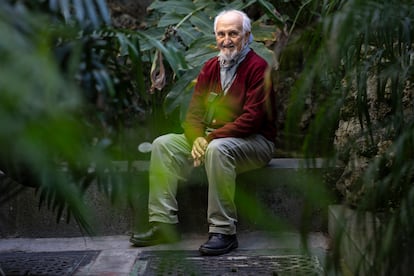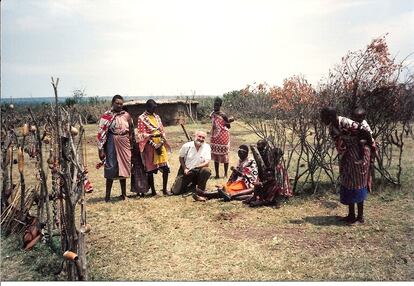The geneticist, engineer and humanist José Esquinas (Ciudad Real) was born among farmers and understood the universal richness of each seed. At 79 years old, he continues to fight hunger, the agri-food industry and the loss of biodiversity for the benefit of “some.” “60% more than what is necessary to feed humanity is produced at the cost of destroying the planet and more than 800 million people are hungry,” he argues. He has published Heading towards ecocide, in which he proposes solutions for the planet’s drift supported by a thousand and one data. Choose to be interviewed at the Royal Botanical Garden-CSIC of Madrid. He enters anonymously, but as soon as the director knows of her presence, she changes her and her staff’s agenda to receive him and offers him to sign the book of illustrious guests.
Ask. How did we arrive at the overproduction-hunger paradox in 2024?
Answer. Due to the process of commodification of food, which was previously sacred and is now pure and simple merchandise. And furthermore, its production, transportation and disposal generates 29% of greenhouse gases and is responsible for 90% of the loss of agricultural biodiversity. It is tremendous that three large multinationals dominate the agribusiness. They control 75% of the world’s commercial seeds and 63% of agrochemicals. This is ignored and that natural resources are being privatized, which leads to speculation and more pollution.
Q. And where does that 60% of unnecessary production go?
R. 1.3 billion tons are wasted and end up in the trash. And we put another part into our bellies with fast food, which in turn produces obesity and overweight and is responsible for the increase in many diseases. Europe spends 700 billion euros a year on medicine to combat them. It is 12 times more than the cost of the Common Agricultural Policy (CAP). Wouldn’t it be more convenient if these funds were to promote agriculture in harmony with the environment?
Information is the first tool against climate change. Subscribe to it.
Subscribe
Q. Is it easy to change the dynamics?
R. You have to try it. To produce anything, you need, on the one hand, natural resources, which are limited and perishable, such as land, water, air, mines, biological diversity and energy. Then technology is required, which is just an instrument; and ethics, which is what should mark those objectives. In the book I also propose legal changes to avoid ecocide or destruction of the environment for this to be considered a crime against humanity triable at the International Court in The Hague.
Q. As co-responsible, it points to society, companies and governments. How important is awareness?
R. I tell an anecdote. In 1992, I represented FAO at the Rio Summit. From there came the slogan ‘Think globally, act locally’. And the measure that ‘He who pollutes, pays’. Because it makes no sense for you and me to pay with our taxes what certain scoundrels have caused to maximize their benefits. Only Holland returned to their country to make it law. And as a consequence the government fell. If there is no awareness, the people will not approve it.
Q. Is it difficult to convey the value of each seed?
R. The elephant or the panda bear are much sexier than wheat or corn, however, these seeds are essential for humanity. Biodiversity is key to adapting to unpredictable environmental conditions aggravated by climate change, such as cold, heat, diseases…
Q. We do see how grain appears in conflicts…
R. Very few people know that the Gestapo had a germplasm collection unit [semillas] of the countries through which he passed. And that one of the objectives of the Nazi invasion of Russia was to appropriate the Vavílof germplasm bank, in Leningrad. Or why Brazil’s gene bank depended on the Ministry of Defense. That is the strategic value that people are unaware of. There is also an open conflict with the ownership of the digital information of the DNA of the seeds. The countries of the south provide biodiversity, and those of the north take advantage of it without recognizing their rights to participate in the benefits.

Q. In Ukraine a mission has been organized to save its seeds.
R. Another very clear case happened in Syria. We work very quickly to send duplicates to other places. What is lost is the work of thousands of years of the farmer to develop varieties, so necessary with climate change.
Q. Is the destruction so fast?
R. Humans have caused climate change and only they can stop it. However, the planet will adapt, what is in danger is our survival and that of other species. There have always been changes, but what is new is its speed. And that increases our responsibility to restore balance. The difference between a caress and a slap is the speed of the hand. It is as if a pilot warns that we are lost, but the cruising speed is excellent. But where are we going? To change course, ecocide To hope, it is necessary to apply ethics, values, responsibility and decide what is desirable for the benefit of humanity and not just some. We have the ability to transform the Earth into a paradise, but also into hell.
Q. What solutions do you propose?
R. There are many in the book. In agriculture; that we bring the place of food production closer to that of its consumption. And that it be with agroecological means so that there is minimal aggression to the environment.
Q. It also talks about causes inherent to the system. What are they?
R. One is the concept of development. If you only look at the GDP you are screwed, because it does not measure your relationship with nature, nor your well-being, nor your happiness. What it gives you is an index of economic growth that, if y
ou ask me, is purely commercial and stock market. An alternative is the Gross Domestic Happiness Index (FIB), proposed by Bhutan. It is measured with indicators such as the number of suicides or the number of doctors and teachers per inhabitant… This breaks the scheme, which is why the vested interests want to stop it. Another element is the representation of future generations in parliaments. It would be a personal or legal entity that questions how each law will affect the unborn. In some countries and many indigenous communities a similar figure already exists.
Q. How much utopia is there?
R. As Don Miguel de Unamuno says, a utopia is a utopia until five people think it is possible, then it is a possibility. Today’s utopias can be tomorrow’s reality if we really fight for it.

You can follow Climate and Environment in Facebook and xor sign up here to receive our weekly newsletter
Subscribe to continue reading
Read without limits
_
#GDP #screwed #measure #relationship #nature #wellbeing